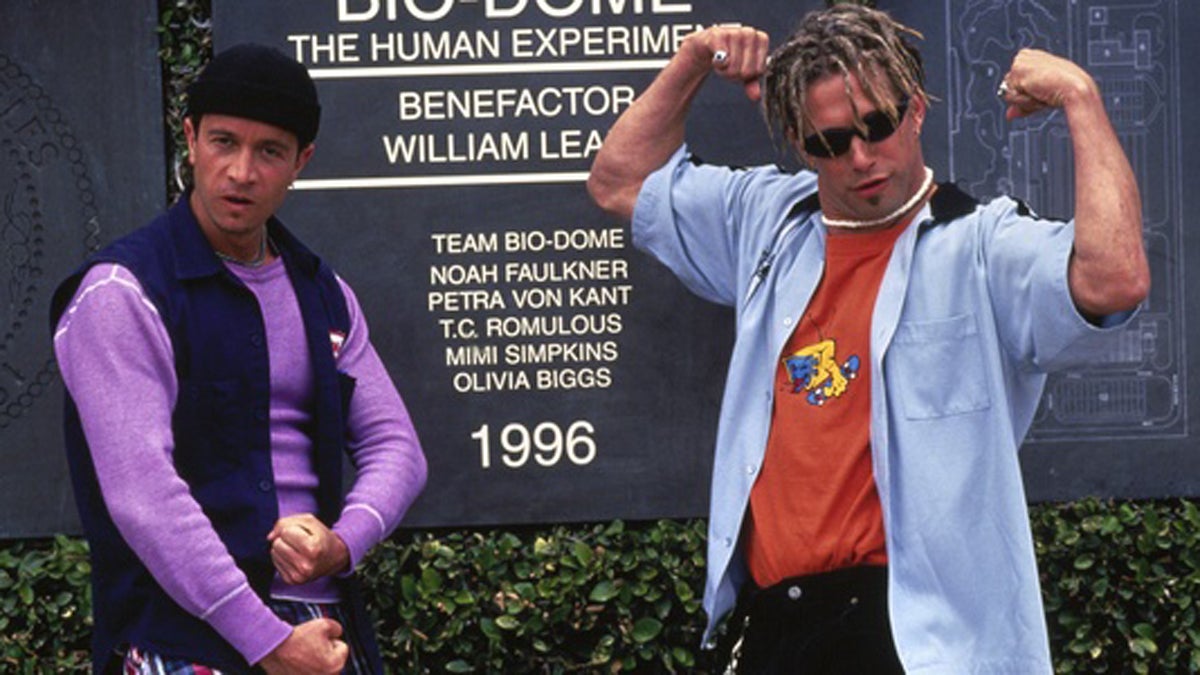Spud Marshall on public pianos, transient communities, and ‘Bio-Dome’

Pauly Shore (left) and Stephen Baldwin starred in “Bio-Dome,” a 1996 movie about two friends who locked themselves in a bio-dome for one year with environmental science students. (Photo by Motion Picture Corporation America)
“Five Questions with…” is a regular Keystone Crossroads feature where we seek to glean wisdom and ideas from some of Pennsylvania’s top urban thinkers and doers. Spud Marshall is the CEO and “Chief Catalyst” of The Co.Space.
Q: Tell us about an amenity or service that you’ve seen in your travels to other places that you wish you could bring back to your city/community?
A: When I traveled to Chattanooga, I learned about their CreateHere program – a five year initiative to radically inspire civic engagement and retain creative, innovative young professionals to the city. Part of the program involved paying a team of dedicated young professionals to move to Chattanooga and create innovation in the city at their discretion.
Unfortunately the CreateHere website is no longer live but the founders continue to do work through groups like CO.LAB.
Q: What’s one urban improvement idea that you could categorize as “nice try but didn’t work”?
A: Not quite sure – although we did try and put pianos up in State College a few years ago for the public to play, but they got torn down because we were told they were a fire hazard and people would light them as bonfires. Then a year later, the public piano project became really popular around the country. So sometimes a good idea doesn’t work simply because of the timing and lack of precedent in a town that isn’t used to taking big risks.
Q: Describe a person in your community who is a “spark” — someone who seems to get things done and inspire people. (This does not need to be an elected official.)
A: Todd Erdley has been an incredibly inspirational person for me in State College. He is the CEO of Videon and has been incredibly supportive of building the entrepreneurship ecosystem in our region. He was one of the first people in town that was able to empathize with me as a young innovator in town and what some of the struggles were that my biz partner and I were running into.
Q: What flaw or habit does your city/community have that you would like to see change?
A: Because of the transient nature of State College, it is incredibly easy for people to say they want change, but then not to act because they know that many of the young people with creative ideas will be gone in four years. In order to make the Centre region known as an innovative town, it’s important that young creative energy fills our towns and that requires community members to believe in young people and their ideas, even knowing that many of those ideas may fail and fizzle out.
Q: Tell us about a movie or book that depicts, in a way that grabbed your attention, how a city can thrive or fail.
A: “Bio-dome” – don’t judge, first thing to come to mind. A city is much like an ecosystem, with countless varieties of plants that make the town unique. In order for it to flourish, the system needs to be nurtured and encouraged to grow spontaneously, unlike commercial agriculture which consists of the same species planted over and over in neat straight lines. To build flourishing cities, we need to encourage a dynamic ecosystem with plants and weeds, good ideas and bad ideas. Because sometimes, the weeds turn out to be the game-changing ideas.
Is there someone you know who thinks hard about cities and knows how to get things done? Someone whom Keystone Crossroads should spend “Five Questions with …” Please let us know in the comment sections below or via Facebook or Twitter @Pacrossroads.
WHYY is your source for fact-based, in-depth journalism and information. As a nonprofit organization, we rely on financial support from readers like you. Please give today.


